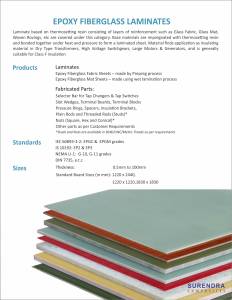
Fiber Glass Laminates are high-strength, lightweight composite materials manufactured by bonding layers of fiberglass fabric with a resin matrix, typically epoxy, polyester, or vinyl ester. This layered structure creates a material with exceptional mechanical properties, making it ideal for a wide range of applications demanding durability, strength, and resistance to various environmental factors.
Key Features & Benefits:
Applications:
Fiber glass laminates find extensive use in a variety of sectors, including:
Types & Specifications:
The properties of fiber glass laminates can be tailored by varying:
Customization Options:
We offer customized fiber glass laminate solutions to meet specific project requirements. This includes:
Contact us today to discuss your fiber glass laminate requirements and receive a customized quote.